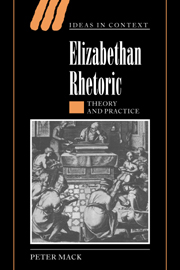Book contents
- Frontmatter
- Contents
- Acknowledgements
- Introduction
- 1 Rhetoric in the grammar school
- 2 Rhetoric and dialectic at Oxford and Cambridge
- 3 English-language manuals of rhetoric and dialectic
- 4 Everyday writing: notebooks, letters, narratives
- 5 Histories, conduct manuals, romances
- 6 Political argument
- 7 Elizabethan parliamentary oratory
- 8 Religious discourse
- Conclusion
- Bibliography
- Index of rhetorical and dialectical terms
- General index
- IDEAS IN CONTEXT
8 - Religious discourse
Published online by Cambridge University Press: 22 September 2009
- Frontmatter
- Contents
- Acknowledgements
- Introduction
- 1 Rhetoric in the grammar school
- 2 Rhetoric and dialectic at Oxford and Cambridge
- 3 English-language manuals of rhetoric and dialectic
- 4 Everyday writing: notebooks, letters, narratives
- 5 Histories, conduct manuals, romances
- 6 Political argument
- 7 Elizabethan parliamentary oratory
- 8 Religious discourse
- Conclusion
- Bibliography
- Index of rhetorical and dialectical terms
- General index
- IDEAS IN CONTEXT
Summary
The chief official aim of university education in Elizabethan England was the production of a learned and godly ministry. The Church of England employed more university graduates than any other profession and many university scholarships and fellowships required their beneficiaries to enter the Church. Even though declamation and disputation were not explicitly designed to prepare for sermon-giving and theological controversy, the skills these university exercises fostered were obviously helpful in such clerical duties.
At the same time the classical learning of the university arts course in some ways conflicted with Christian ideals. Christian thinkers traditionally distrust pagan culture even when they recognise the practical usefulness of rhetoric. Even Erasmus thought that good preaching depended more on belief and inspiration than on rhetorical invention. The classical educational ideals of the orator and the philosopher carried implications of exceptionalness, leadership, wealth and leisure which were opposed to Christian notions of simple piety. Protestant emphasis on predestination gave this tension a new twist. Where education aimed at moral and intellectual improvement and was in principle available to anyone with leisure and aptitude, salvation was unearned and by free gift of God to the elect alone. In practice humanist education was far from universally available, but it did create the means for some mobility in society and employment, particularly within the visible church. Predestination defined a different, unworldly, but theoretically closed élite, who believed in the essential corruption of the fallen human mind and for whom education might therefore seem positively harmful.
- Type
- Chapter
- Information
- Elizabethan RhetoricTheory and Practice, pp. 253 - 292Publisher: Cambridge University PressPrint publication year: 2002
- 1
- Cited by



